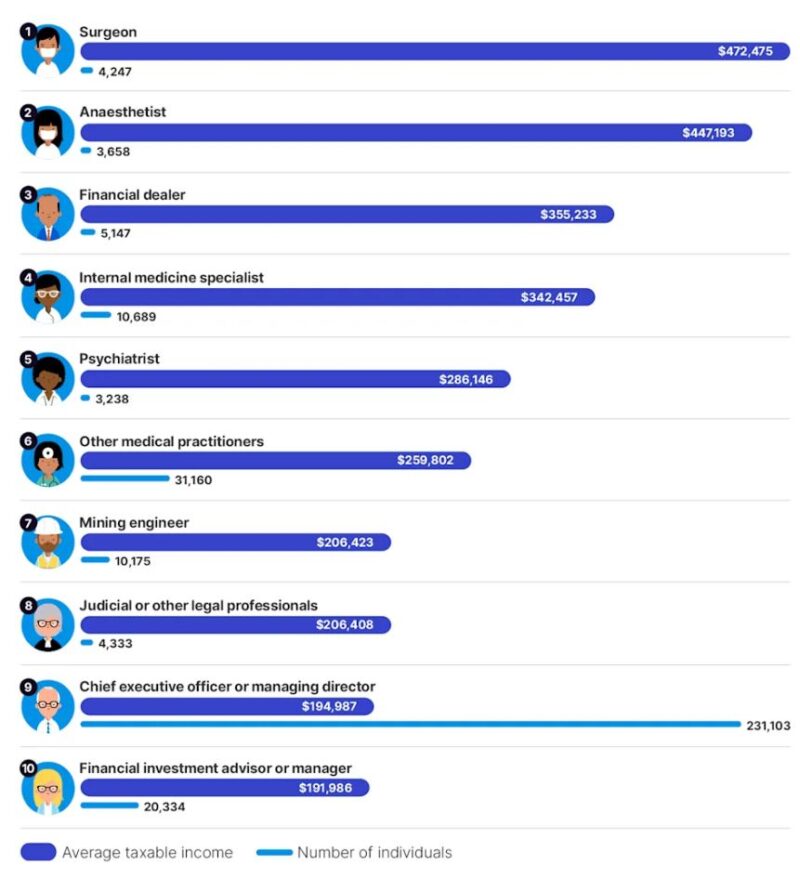
Key takeaways
Surgeons top the list again of high income earners, earning an average of $472,475 a year, over six times the average taxable income of Australians.
Medical professionals dominate the top-paying jobs, with anaesthetists, internal medicine specialists, and psychiatrists all ranking highly.
Finance, law, mining, and executive roles also feature, with financial dealers earning an average of $355,233 and CEOs/managing directors averaging $194,987.
The average Australian taxable income is $74,240, while the median income is much lower at $55,868 – highlighting the significant income gap.
Only 5.3% of Australians earn over $180,000, yet they contribute 37% of the nation’s net tax.
Superannuation balances are rising, with an average of $172,834, but the median is just $60,037, again showing uneven wealth distribution.
Ever wondered who in Australia is really taking home the big bucks?
Well, the Australian Taxation Office (ATO) has just released its latest income statistics, and the numbers might surprise you, as reported by Yahoo Finance.
While most Australians are feeling the pinch of rising costs of living, some professions are earning more in a single month than many households bring in over an entire year.
And the figures show that the gap between the highest earners and the “average Aussie” keeps widening.
So let's dig into what the data shows, who’s earning what, and what it all means for you.
Surgeons still lead the pack
No surprises at the very top. Surgeons once again claimed the crown, earning an average of $472,475 a year.
That’s more than six times the average taxable income of $74,240.
But here’s something to note: there are only 4,247 surgeons across the country.
In other words, it’s an elite, highly specialised group.
Years of study, huge responsibility, and limited supply make them Australia’s highest-paid professionals.
Anaesthetists aren’t far behind, pulling in an average of $447,193, followed by financial dealers (think stockbrokers and traders) at $355,233.

Source of Image: Yahoo Finance
The top 10 highest-paid jobs in Australia
According to the report, here’s the full rundown based on 2022–23 tax returns:
-
Surgeon – $472,475 (up $12,119)
-
Anaesthetist – $447,193 (up $16,000)
-
Financial Dealer – $355,233 (down $18,500)
-
Internal Medicine Specialist – $342,457 (up $1,728)
-
Psychiatrist – $286,146 (up $9,601)
-
Other Medical Practitioners – $259,802 (up $4,048)
-
Mining Engineer – $206,423 (down $7,942)
-
Judicial & Legal Professionals – $206,408 (up $1,474)
-
CEO/Managing Director – $194,987 (down $2,733)
-
Financial Investment Advisor/Manager – $191,986 (up $6,152)
Medical roles clearly dominate, but finance, mining, law, and executive leadership still feature strongly.
What about the rest of us?
While these headline figures grab attention, the reality is very different for most Australians.
The average taxable income was $74,240, and the median income, often a better measure of “typical” earnings, was just $55,868.
That means half the working population earns less than $56,000.
Compare that to the nearly half a million dollars earned by surgeons, and you get a stark picture of income inequality in Australia.
Tax and Super: who’s carrying the load?
Interestingly, only 5.3% of Australians earn over $180,000 a year, yet they’re responsible for 37% of net tax collected.
Like it or not, our tax system leans heavily on high-income earners.
On the superannuation front, balances are creeping up.
The average account balance rose to $172,834, though the median balance sits far lower at $60,037.
Again, it’s a reminder of how uneven wealth distribution is.
What does this mean for you?
While these numbers make great headlines, they also tell us something important about wealth creation.
Very few Australians will ever land in the top 1% of earners by profession alone.
The path to wealth for most people isn’t about earning a surgeon’s salary, it’s about what you do with the income you’ve got.
That means being smart with money:
-
Investing in appreciating assets like property and shares.
-
Building multiple income streams rather than relying on a single salary.
-
Leveraging tax strategies and structures to legally minimise tax and grow wealth faster.
-
Focusing on long-term compounding rather than chasing short-term gains.
The truth is, you don’t need to be a surgeon or CEO to achieve financial independence.
Many Australians earning average incomes have built multi-million-dollar property portfolios, simply by starting early, investing strategically, and letting time and compounding do the heavy lifting.
Final thoughts
The ATO’s latest data gives us a glimpse into Australia’s top earners, but it’s not just a leaderboard of professions, it’s a reminder of the broader wealth gap.
For most people, financial freedom won’t come from earning a six-figure salary in medicine or finance.
It will come from smart investing, disciplined saving, and a long-term strategy.
After all, you don’t need to be in the top 10 jobs to be in the top 5% of wealthy Australians.














